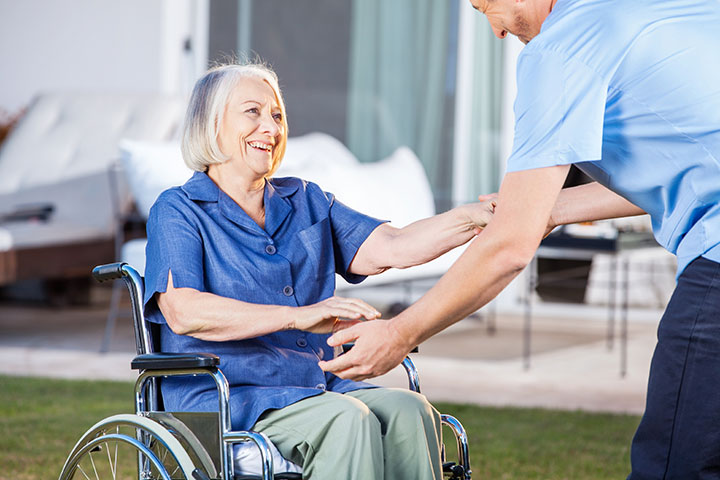In an earlier blog entry, we wrote about the forgotten daughters. While these women come from diverse backgrounds, more often than not, they fall into caregiving because they have no other choice. And while caregiving comes from a loving place, it can add stress and become a financial burden.
That burden has traditionally fallen on women, although men have increasingly shared some of the same tribulations that affect female caregivers. A 2017 study by AARP reported that 40% of unpaid caregivers were men, an increase from 34% just eight years earlier. As of 2023, 44% of unpaid caregivers were male.
The AARP study found that just like their female counterparts, the growing number of fathers, sons, husbands, and friends who took on caregiving often had little choice. The AARP also reports both men and women caregivers begin around the same age, and that they are prone to health problems and depression compared to their non-caregiving peers. Generally speaking, men and women caregivers provide the same kind of care, too.
Differences Between Male and Female Caregivers
But, the study did find differences between the male caregivers and females. Male caregivers tend to be less comfortable with the hands-on aspect of caregiving, for example. This includes things like bathing and helping someone use the toilet. Jean Accius, who authored the study, says this could be due to the fact that some of these men weren’t as hands-on with child-care — like changing diapers and giving baths — making the transition increasingly difficult.
According to the study, male caregivers are also more likely to be juggling longer hours at work alongside their caregiving duties. But, it’s important to note that almost half of both men and women caregivers reported taking time off work to help their family member — another 15 percent saying they had to take a leave of absence or go down to part time.
Men may be less likely than women to identify themselves as caregivers. According to AARP, men “tend to break down caregiver roles into tasks to be checked off a list and completed, which means they often don’t recognize their actions as caregiving contributions.” Men may also be more likely to hire a caregiver when the tasks involve touching (such as helping a parent bathe) that might embarrass them.
The largest groups of men providing caregiving to adult relatives are Baby Boomers, followed by Millennials. The health service director of a senior living community told AARP that males in those generations are becoming more comfortable in a caregiving role. Empathy and compassion have traditionally been associated with women more than men, but the need to take care of an aging parent gives men the opportunity to develop and display those traits.
About a third of unpaid male caregivers are Black. They are less likely to be married than other caregivers and are more likely to be taking care of someone by themselves. A study-in-progress suggests that Black males experience greater financial stress from caregiving than other unpaid caregivers.
Male Caregivers Less Likely to Open Up About Emotional Struggles
The men in the AARP study also differentiated themselves from their female counterparts by saying they are less likely to open up to others about their struggles, stresses and even sadness.
James Dotson of Silver Spring, Maryland, who was interviewed by the organization, spoke to that point, saying that while caring for his mother who suffered from Alzheimer’s, he rarely ever talked to his family about the stress and pressure he was under. It was years later before he suddenly “broke down in tears” while giving his family an update on his mother’s condition.
Reflecting back on that time, Dotson admitted he believes this could be common among men: “We just hold stuff in.”
With the release of their new study, AARP and the AdCouncil also created a public service announcement aimed at shedding light on the growing number of caregivers. In it, famous tough-guy Danny Trejo goes through a very macho routine while praising the real “toughest guy on earth” — a man who cares for his father.
Peer Support Critical for All Caregivers
While the study shows some differences between the growing population of male caregivers and female caregivers, experts like Edwin Walker, a deputy director at the Department of Health and Human Services, say the main piece of advice is the same for both groups: “Peer support is absolutely critical.”
Howard Geckman, an opinion contributor at Forbes, touched on this, saying “That sense of aloneness is common among many caregivers — men and women — because supporting a loved one can be so time-consuming and isolating. You go to work, rush home to take care of dad, fall asleep, and do it all over again the next day. That time to relax with friends — golfing, fishing, the weekly poker game — falls away. And, often, so do your friends.”
Whether you reach out to a friend or family member or get involved in a support group, it is important to let the stress out, but also take time for your own wellbeing — both emotionally and physically.
Dustin Cesarek, a 32-year-old from Minneapolis who cares for his wife with breast cancer, started a support group with two other men going through the same situation. They call the group “Jack’s Caregiving Coalition” and he says it has become a major support network “where guys can feel comfortable.”
Experts also say it is important to ask for help — because sometimes it can all be too much for just one person.
Do you know a male caregiver that you consider “the toughest man on earth”? Share this article with him — as well as your other friends and family on Facebook, Twitter and Pinterest.
(This article has been updated August 2024 since it originally published in June, 2017.)
